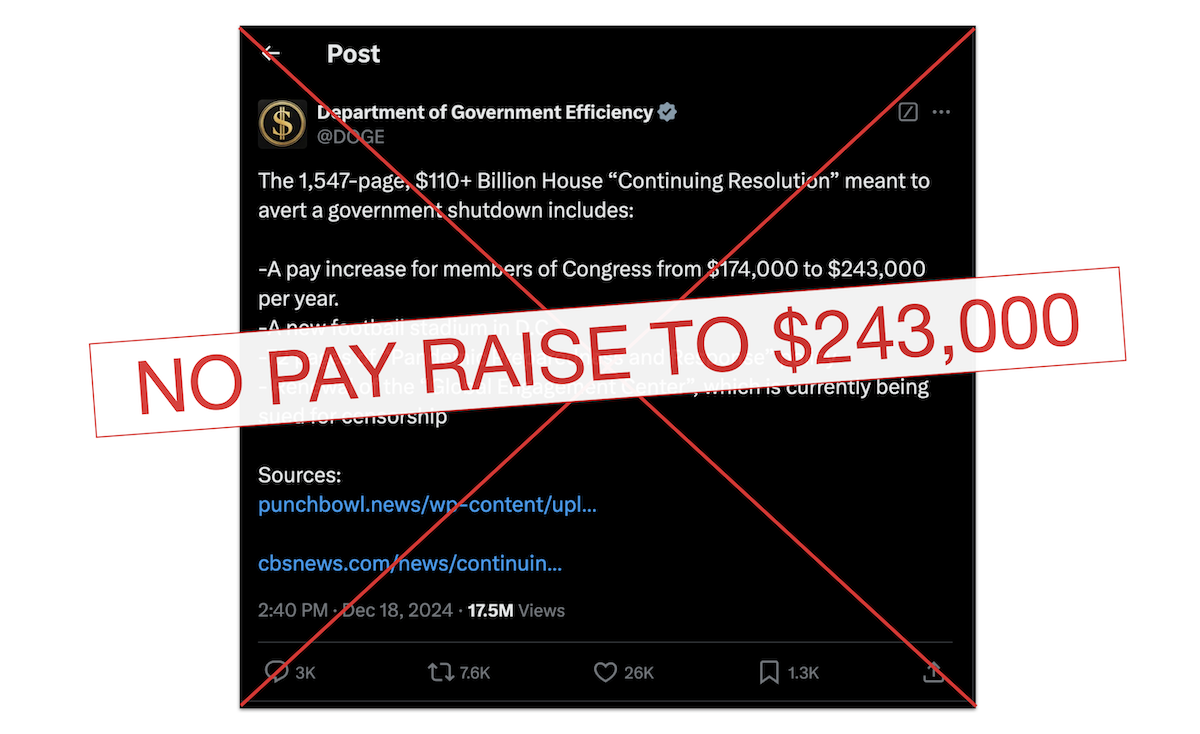

Our only agenda is to publish the truth so you can be an informed participant in democracy.
We need your help.


House Speaker Mike Johnson, R-La., from left, walks with Vivek Ramaswamy and Elon Musk as they arrive for a roundtable meeting to discuss President-elect Donald Trump's planned Department of Government Efficiency on Capitol Hill, Dec. 5, 2024. (AP)
The proposed continuing resolution would raise most senators’ and representatives’ salaries by about $6,600, not by more than $60,000 as the incoming Department of Government Efficiency claimed on X.
An existing law uses a formula to determine annual raises for members of Congress, and it takes effect unless Congress denies it by statute.
For years, Congress has blocked the increase. However, a provision freezing member pay was not included in the proposed continuing resolution.
Business executives Elon Musk and Vivek Ramaswamy, co-leaders of the Department of Government Efficiency, an incoming advisory committee, came out with a host of reasons that Congress should ditch a plan to fund the government and avoid a government shutdown by Dec. 21. Their concerns made it to President-elect Donald Trump, who then announced his opposition to the continuing resolution, making its passage unlikely.
On X, Musk — who declared the bill "dead" — urged lawmakers to vote against the continuing resolution. Similarly, Ramaswamy said he read the approximately 1,500-page bill and described it as "full of excessive spending" and said it "should fail."
The committee, which calls itself DOGE for short, on X also criticized the continuing resolution for, among other things, purportedly including "a pay increase for members of Congress from $174,000 to $243,000 per year."
Lawmaker pay increases are politically contentious, and PolitiFact frequently fact-checks inaccurate claims about congressional compensation changes.
Congress hasn’t increased its pay since 2009, so the idea that it would propose nearly $70,000 raises in stopgap legislation caught our attention.
We found that the Department of Government Efficiency’s claim inflated the proposed raises by more than $60,000. The continuing resolution would raise most lawmakers’ salaries by about $6,600.
We messaged the DOGE X account to ask for evidence that the bill included a $69,000 raise for lawmakers and to ask who writes the account’s X posts. We received no response before publication.

(Screenshot from X)
If passed as is, the continuing resolution increases Congress members' pay by 3.8%, according to a Congressional Research Service report.
Most rank-and-file Congress members make $174,000 annually, meaning they would receive a $6,600 increase for a total salary of $180,600.
This isn’t because lawmakers are including a specific provision that would raise their pay, however. It’s because they’ve left out a provision that would freeze member pay.
The Ethics Reform Act of 1989 established a formula that relies on changes in private sector wages and salaries to determine automatic annual pay adjustments for Congress members, according to the Congressional Research Service. Under that act, salaries are adjusted annually using the formula unless Congress denies it by statute or it is limited by base pay increases for general schedule federal employees.
Two previous versions of 2025 appropriations bills included language that would have prohibited the salary increases lawmakers are allowed by statute.
The July Senate bill, for example, included a provision titled: "Limitation on cost of living adjustments for members." That provision said that "notwithstanding any other provision of law, no adjustment shall be made" during fiscal year 2025 related to "cost of living adjustments for Members of Congress."
The continuing resolution did not include a provision freezing the automatic pay increase, meaning members would have received the 3.8% pay increase afforded to them by existing statute.
The DOGE X account said the continuing resolution includes "a pay increase for members of Congress from $174,000 to $243,000 per year."
The continuing resolution would have raised most representatives’ and senators’ salaries by about $6,600 — to $180,600 per year.
The Department of Government Efficiency’s claim inflated that raise by more than $60,000.
We rate this claim False.
RELATED: 'Transgender monkeys'? Musk highlights misleading posts in push for new Government Efficiency group
RELATED: 2 weeks, 450+ posts: How Elon Musk uses his X profile to push FEMA, immigration, voting falsehoods
Department of Government Efficiency’s X post, Dec. 18, 2024
Continuing Resolution, accessed Dec. 18, 2024
Congressional Research Service, Salaries of Members of Congress: Recent Actions and Historical Tables, Sept. 26, 2024
Politico, Lawmakers are primed to get a pay bump. Some aren’t happy about it, Dec. 18, 2024
Business Insider, Members of Congress may be about to get a pay raise for the first time since 2009, Dec. 18, 2024
The Washington Post, Do members of Congress need a pay raise? After 15 years, some say yes, June 15, 2024
Politico, Elon Musk fueled backlash to spending plan with false and misleading claims, Dec. 18, 2024
Bloomberg Government, Congress Pay Raise Allowed Under Funding Bill to Avert Shutdown, Dec. 17, 2024
Rep. Jared Golden’s website, Golden a ‘no’ vote on CR over Congressional self-dealing, Dec. 18, 2024
Office of Personnel Management, General Schedule, accessed Dec. 19, 2024
Elon Musk’s X post, Dec. 18, 2024
Elon Musk’s X post, Dec. 18, 2024
Elon Musk’s X post, Dec. 18, 2024
Vivek Ramaswamy’s X post, Dec. 18, 2024
Vivek Ramaswamy’s X post, Dec. 18, 2024
JD Vance’s X post, Dec. 18, 2024
In a world of wild talk and fake news, help us stand up for the facts.
